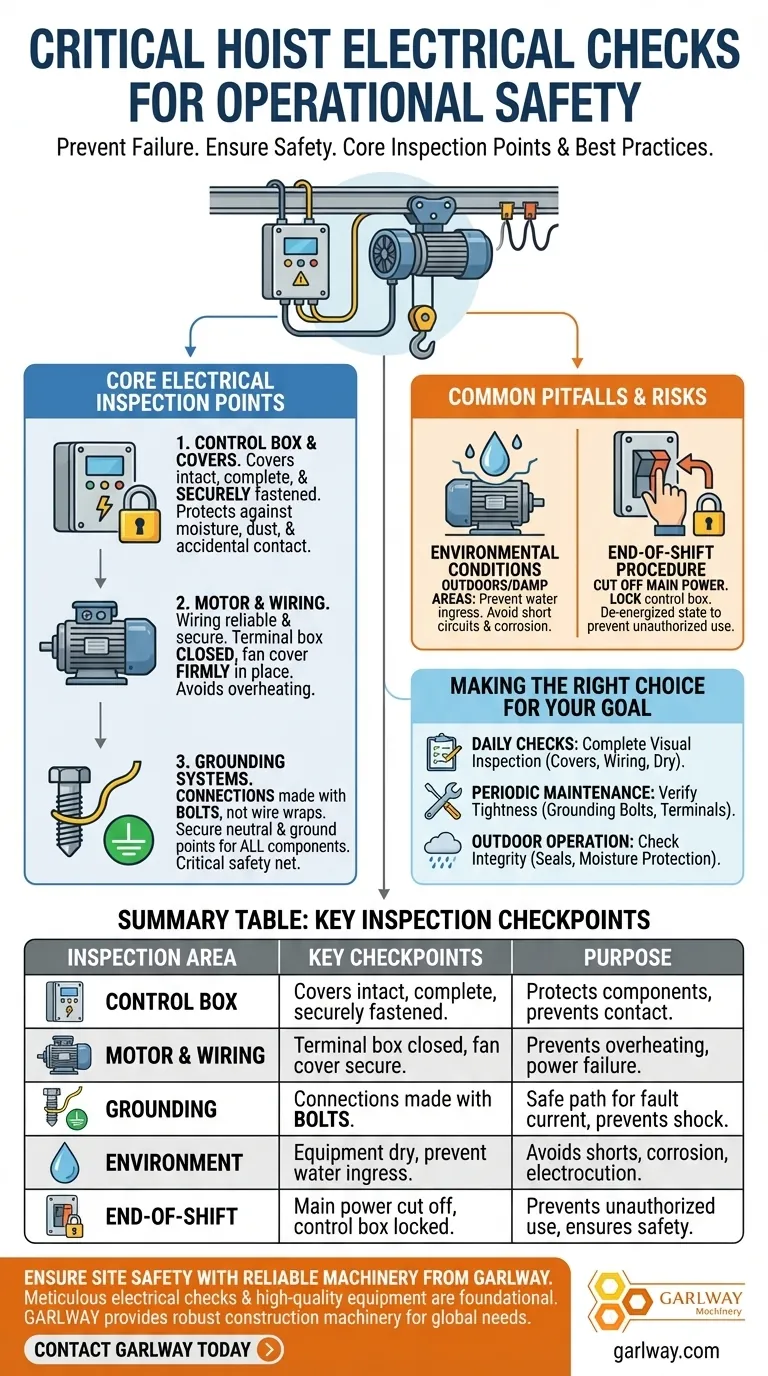To ensure operational safety, operators must regularly inspect the hoist's electrical wiring, control box, motor connections, and grounding. Key checks include confirming that all electrical covers are intact and complete, the hoist motor's terminal box and fan cover are securely installed, and that all grounding connections are made with bolts, not simple wire wraps.
The core principle behind regular electrical checks is not just about function, but about preventing catastrophic failure. A secure, properly grounded, and protected electrical system is the primary defense against equipment damage and serious electrocution hazards.

Core Electrical Inspection Points
A thorough visual inspection of the hoist's electrical system can preempt the most common and dangerous failure modes. This should be a systematic part of any pre-use checklist.
The Control Box: The System's Nerve Center
The control box houses the critical components that manage the hoist's operation. Its integrity is paramount.
Operators must verify that the electrical covers on the control box are intact, complete, and securely fastened. These covers protect sensitive components from moisture, dust, and physical damage, while also preventing accidental contact with live parts.
The Motor & Wiring: The Power Pathway
The motor's connections are subjected to vibration and environmental stress, making them a key point of inspection.
Ensure the hoist motor wiring is reliable and secure. This includes checking that the terminal box is properly closed and the fan cover is firmly in place. Loose connections can lead to overheating and power failure, while a missing fan cover can cause the motor to overheat.
Grounding: The Critical Safety Net
Proper grounding is the single most important safety feature of the electrical system. It provides a safe path for fault current, preventing the hoist's metal frame from becoming energized.
Confirm that the hoist, control box, and switch have reliable neutral or ground connections. These connections must be made with bolts for a secure mechanical and electrical bond. Wire-wrapped connections are insufficient as they can loosen over time.
Common Pitfalls and Environmental Risks
Beyond the core components, operators must be aware of external factors and common oversights that can compromise electrical safety.
Ignoring Environmental Conditions
For any hoist used outdoors or in damp environments, environmental protection is not optional.
Operators must ensure that adequate measures are in place to prevent electrical equipment from getting wet. Water ingress can cause short circuits, corrosion, and immediate electrocution risks.
The End-of-Shift Procedure
Safety checks don't end when the work is done. Securing the equipment is a final, critical step.
Before leaving the equipment, the operator must cut off the main power supply and lock the control box. This prevents unauthorized use and ensures the system is left in a safe, de-energized state.
Making the Right Choice for Your Goal
Your inspection frequency and focus may change based on the operational context.
- If your primary focus is daily pre-use checks: Perform a complete visual inspection to ensure all covers are in place, there is no visible damage to wiring, and the equipment is dry.
- If your primary focus is periodic maintenance: Go beyond the visual check to physically verify that all grounding bolts and terminal connections are tight and free of corrosion.
- If your primary focus is outdoor operation: Pay special attention to the integrity of all seals and covers, ensuring the system is protected from moisture before every use.
Ultimately, consistent and thorough electrical inspections are a non-negotiable requirement for safe and reliable hoist operation.
Summary Table:
| Inspection Area | Key Checkpoints | Purpose |
|---|---|---|
| Control Box | Covers intact, complete, and securely fastened. | Protects components from moisture/dust and prevents contact with live parts. |
| Motor & Wiring | Terminal box closed, fan cover secure, wiring reliable. | Prevents overheating, power failure, and motor damage from vibration. |
| Grounding | Connections made with bolts (not wire wraps) for hoist, control box, and switch. | Provides a safe path for fault current, preventing the frame from becoming energized. |
| Environment | Equipment is dry; measures in place to prevent water ingress (especially outdoors). | Avoids short circuits, corrosion, and immediate electrocution hazards. |
| End-of-Shift | Main power supply cut off; control box locked. | Prevents unauthorized use and ensures a safe, de-energized state. |
Ensure your job site's safety and efficiency with reliable construction machinery from GARLWAY.
Just as meticulous electrical checks are vital for hoist safety, using high-quality, dependable equipment is the foundation of any successful construction project. GARLWAY specializes in providing robust construction machinery—including winches, concrete mixers, and concrete batching plants—designed for the demanding needs of construction companies and contractors globally.
Let us help you build with confidence. Contact GARLWAY today to discuss your equipment needs and discover how our solutions can enhance safety and productivity on your site.
Visual Guide

Related Products
- Portable Cement Mixer with Lift Concrete Machine
- Commercial Construction Mixer Machine for Soil Cement Mixing Concrete
- Ready Mixer Machine for Construction Ready Mix Machinery
People Also Ask
- What are the four types of wire rope electric hoists? Choose the Right Hoist for Your Space & Needs
- What was the historical example of a hydraulic winch being used for recovery? The WWII T-34 Tank Recovery Story
- In what types of industrial applications can electric winches be used? Boost Efficiency & Safety
- What is the rule of thumb for winch size? Ensure Safe & Powerful Vehicle Recovery
- Why is understanding the physics of winches important for users? Master Your Recovery & Maximize Safety
- Why is winch line layer thickness a factor in winching capacity? Maximize Your Pulling Power
- What are the main components of a towing winch? The Essential Guide to Its Powerful Core Systems
- What are the two basic types of anchor windlasses? Horizontal vs. Vertical Explained


